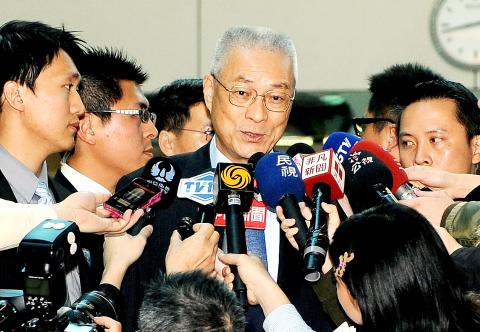|
TSU calls on Wu to
clarify formula
MAKE IT CLEAR: The ‘two areas’ in the ‘one
country, two areas’ proposal both fall under supervision of the ROC, and Wu Den-yih
should specify this in China, the TSU said
By Lin Shu-hui / Staff reporter

Vice president-elect Wu Den-yih
talks to the press at Taiwan Taoyuan International Airport yesterday.
Photo: Chu Pei-hsiung, Taipei Times
Vice president-elect Wu Den-yih (吳敦義), in
his meeting with Chinese Vice Premier Li Keqiang (李克強), should make clear that
the term “one country” in the “one country, two areas” touted by the Chinese
Nationalist Party (KMT) refers to the Republic of China (ROC), or the proposal
is nothing but a fraud, Taiwan Solidarity Union (TSU) Chairman Huang Kun-huei
(黃昆輝) said yesterday.
“Since President Ma Ying-jeou (馬英九) said that the term ‘one country’ in the ‘one
country, two areas’ proposal refers to the ROC, Wu should clarify this directly
with Li. He should also specify that the ‘two areas,’ the ‘mainland area’ and
the ‘Taiwan area,’ both fall under the supervision of the ROC,” Huang said. “In
addition, Wu should state that the ‘one China’ in ‘one China, different
interpretations’ also refers to the ROC.”
Wu yesterday departed for the Boao Forum being held in China’s Hainan Island
from today through Tuesday. Wu is attending the forum in his capacity as the top
adviser to the Cross-Straits Common Market Foundation, rather than as vice
president-elect, and is expected to meet Li at the forum today. Li is widely
tipped to become China’s premier when the country undergoes a leadership
transition later this year.
Huang said that Ma only dared interpret “one country” and “one China” as the ROC
in front of Taiwanese.
The “one country, two areas” formula former KMT chairman Wu Poh-hsiung (吳伯雄)
touted during his meeting with Chinese President Hu Jintao (胡錦濤) on March 22 in
Beijing would likely be interpreted by the international community as Taiwan’s
official acceptance of the concept of “one China” as recognized by the majority
of countries as meaning the People’s Republic of China (PRC), Huang said.
The rhetoric suggested that Ma had willingly degraded Taiwan into a “Taiwan
area” special administrative region like Hong Kong, Huang said.
TSU caucus convener Hsu Chun-hsin (許忠信) said Wu Den-yih had failed to brief the
public on the topics to be discussed when he meets China’s top officials at Boao.
This highlights a lack of transparency and inequality between the two sides at
the forum, which is detrimental to Taiwan, Hsu added.
Noting that Vice President Vincent Siew (蕭萬長) had also paid Hu a visit after Ma
took office in 2008, Hsu, pointing to Wu Den-yih’s meetings with high-ranking
Chinese officials through the Boao Forum, expressed further concerns.
“Such meetings could turn into a convention between the KMT and China. What if
Wu Den-yih’s mission is to brief Chinese leaders of Taiwan’s four-year plans on
cross-strait policies? Will Beijing also ‘give out instructions’ on the
direction of cross-strait relations to Wu?” Hsu said, adding that such
closed-door meetings would only bring harm to Taiwan.
Prior to his departure for China yesterday, Wu Den-yih reiterated that the “one
country” referred to in the new formula is the ROC.
The “one China” mentioned in the so-called “1992 consensus” also refers to the
ROC under Taiwan’s interpretation of the formula, he said, while China can
define “one China” in any way it wants.
“Only by shelving differences can we jointly create a win-win situation,” he
added.
Additional reporting by CNA
Translated by Stacy Hsu, Staff Writer
|
![]()
![]()
![]()